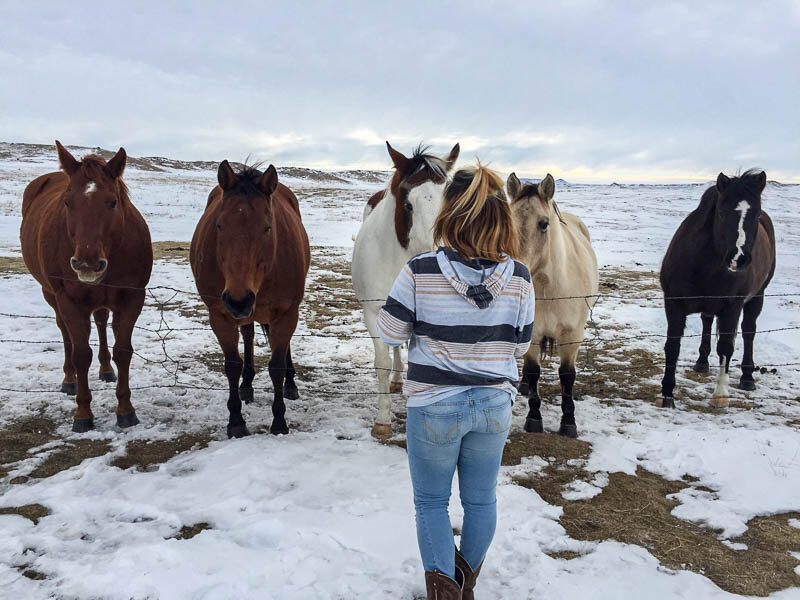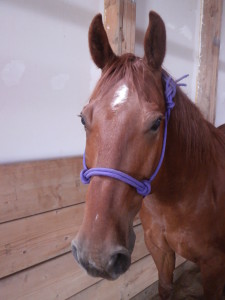
Home On The Range offers a variety of therapeutic programs. We use evidence-based and experiential therapies. HOTR has a team of professional clinical staff that oversee the majority of groups. Utilizing the natural resources of the land, ranch and animals, the groups include adventure and animal assisted therapies, or hands-on participation. These therapies work well…
Animal Assisted Interventions include both Equine Assisted programs and Canine Assisted programs. All are incorporated into trauma specific habilitation goals. Specific models and approaches include EAGALA (Equine Assisted Growth and Learning Assocation), Natural Lifemanship/Rhythmic Riding, mule driving programs, and some therapeutic riding.
Canine Program
Canine Program: The Canine Program is a trauma informed, experiential group designed to engage youth in the treatment process. This program works to assist residents in self-identifying improved problem solving techniques and increasing independence. Participants are paired with rescue dogs and develop a treatment plan to address behavioral issues presented by their canine partner. This process promotes the development of executive function skills such as planning and prioritizing, task initiation and organization. Residents assist in training shelter dogs in basic obedience, socialization, and house training so they can be adopted out to appropriate families.
Equine Program
Equine Program: Horses have played a key role in the history of Home On The Range. This tradition continues today in a variety of treatment and leisure activities. The Equine Program is a trauma informed, experiential based intervention, which includes the use of horses and mules. This intensive, outcome based treatment program was designed for individuals presenting with externalizing issues such as poor anger management, impulsivity, low frustration tolerance and nonverbal communication difficulties. The program is a combination of ground work with horses as well as riding and mule driving activities. The overall intent of the equine program is improving emotional regulation, problem solving and team work skills. The program consists of group, individual and family sessions as deemed appropriate and manageable. Home On The Range, in collaboration with North Dakota State University, has been conducting outcome studies on the efficacy of equine therapy. The research data has been nationally recognized and presented at various conferences.
Natural Lifemanship: Natural Lifemanship is a Trauma Focused Equine Therapy model that is part of the Equine Program and includes a technique referred to as “Rhythmic Riding.” This technique is relationship based experience between the group member and their chosen horse, and was designed to assist group members in learning how to self-regulate their emotional states. Individuals with traumatic backgrounds often experience difficulty in regulating their “fight/flight” responses to stress and stimuli, and often take a longer time to “return to normal” after being triggered to a heightened state of arousal. Trauma Focused Rhythmic Riding combines horse-back riding, mindfulness skill components, and relationships into a “dance” of learning opportunity. Simply stated, residents are able to experience the present moment while listening to meaningful songs (they select) and riding to the rhythm of the music. Between songs, mindfulness practice is utilized to assist group members in regaining emotional regulations which can so easily become dysregulated during the riding activity.
Horsepacking Program is a unique treatment intervention that joins two experiential, “bottom up” activities; equine and adventure therapy. Participation in this program provides traumatized youth an opportunity to develop a bonded, mutually satisfying relationship with an equine partner, which relies upon interpersonal rhythm, visceral awareness and vocal and facial communication, all of which help traumatized youth reorganize their perceptions of danger and increase their capacity to manage relationships. It is within the context of this relationally-driven intervention that recalibration of the autonomic nervous system occurs and gives rise to neurological re-wiring of secondary and primary process emotions. Venturing into the backcountry with an equine teammate provides the catalyst for building connections to oneself, others and the great outdoors.
“My horse’s name is Peppy. I picked him because he has a personality that is pretty close to mine. He is very stubborn. Just like me, he has taught patience. It takes a lot of patience to deal with horses. I have never touched a horse until I got sent to Home on the Range. I never thought I would end up loving riding. It seems to me that it helps to take my anger out while riding. It’s very relaxing.”
To see pictures of our other horses, please click here.
